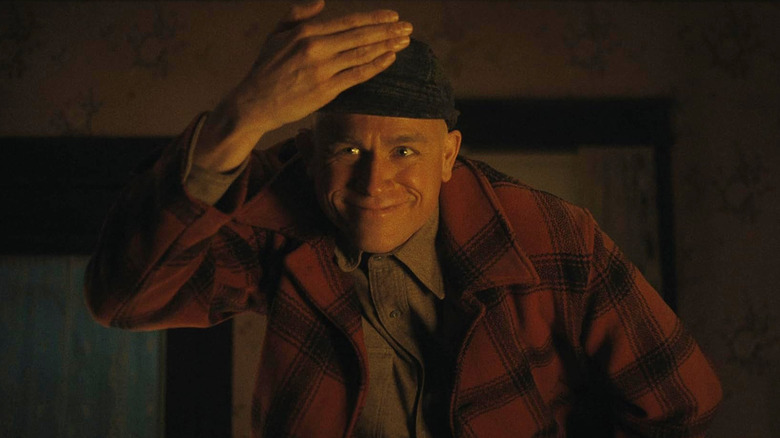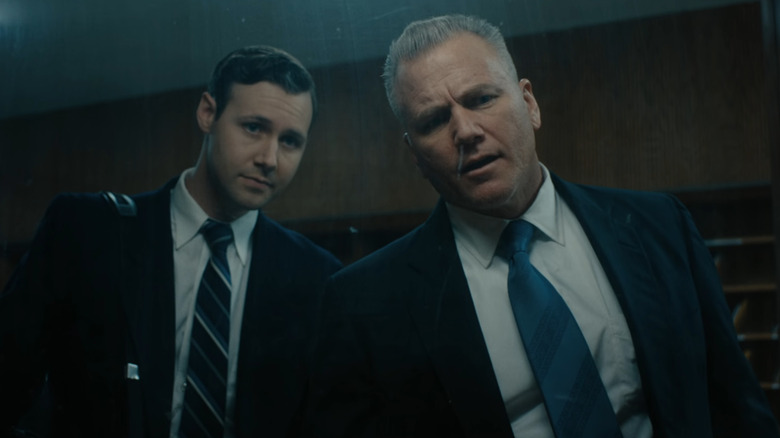Why Ryan Murphy Included That Mindhunter Easter Egg In Monster: The Ed Gein Story
"American Crime Story" and "Monster" creator Ryan Murphy has a history of making ... unusual choices when adapting true stories, often changing facts to make things more entertaining (and salacious) and just as frequently courting controversy by doing so. Admittedly, it can be tricky to get things just right when dealing with topics as complicated as those in "Monster," which details the crimes of alleged real-world killers. For the series' third chapter, "Monster: The Ed Gein Story," Murphy made quite a few big changes and omissions to the tale of notorious Plainfield, Wisconsin killer Ed Gein. Indeed, one particularly strange change even led to the series crossing over with another popular Netflix show: David Fincher's "Mindhunter."
Although the series' timelines don't line up, Murphy nevertheless has Happy Anderson reprise his "Mindhunter" role as Jerry "Shoe Fetish Slayer" Brudos in the "Ed Gein" finale. He even interacts with FBI agents John Douglas (Sean Carrigan) and Robert Ressler (Caleb Ruminer) — who are clearly dressed like their "Mindhunter" counterparts, Holden Ford (Jonathan Groff) and Bill Tench (Holt McCallany) — while the episode around them completely changes the show's style. Speaking to the Los Angeles Times, however, series co-creator Ian Brennan insisted that he and Murphy simply had to pay homage to Fincher's crime show. Claiming that "Monster" finales are "particularly difficult," he explained:
"We knew we needed to top the episodes that had preceded it by shifting the show's look and tone — and we had in our hands the nugget that John Douglas and Robert Ressler had, indeed, interviewed Ed Gein in person. Ryan and I both find David Fincher's oeuvre almost uniquely inspiring, so once we pictured an episode that played as an homage to Fincher's tone and style and narrative approach, it was something I, at least, just couldn't unsee."
Bizarre adaptation choices just seem to be the norm for Monster
To clarify: Douglas and Ressler are the real-life counterparts of the fictional Ford and Tench, and the pair helped to create the FBI's Behavioral Crimes Unit and create a methodology for tracking down serial killers in the real world. (If that sounds familiar, it's probably because Douglas is also the inspiration for the Will Graham character from "Red Dragon" and the "Hannibal" TV series.) But while fans who are desperate for that canceled "Mindhunter" season 3 (either that or the proposed "Mindhunter" movies) might enjoy seeing a watered-down version of the show, it honestly feels bizarre seeing that ultra-grounded world cross streams with the supermarket tabloid gloss of "Monster."
While it's understandable that anyone would want to pay homage to the absolute greatness of Fincher's directorial style and the genius that is "Mindhunter," the only thing "Monster" really accomplishes by directly copying the series this way is a pale imitation. Really, "Monster" and "Mindhunter" take such wildly different approaches to their heavy and sensitive material that seeing them juxtaposed in the "Ed Gein" finale is truly confounding. "Mindhunter" might be fictionalized, but it still deals with real-life history and serial killers. That's also why it takes great care to avoid re-traumatizing the actual victims of the murderers it depicts, all while avoiding playing into harmful tropes. The same can definitely not be said of Murphy and Brennan's show, though. "Monster: The Ed Gein Story" not only plays fast and loose with the facts, but it also continues to demonize transgender women via the deeply harmful "killer crossdresser" trope (see also: "The Silence of the Lambs"). Maybe Murphy should simply leave the serial killer storytelling to Fincher — we'd all be better off.
"Monster" and "Mindhunter" are both streaming on Netflix.

